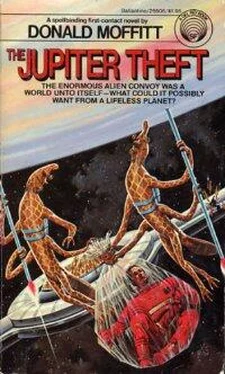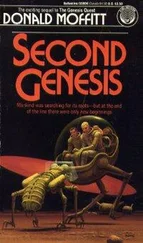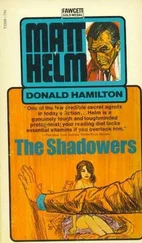Jameson said, “Maybe the Cygnans have finally got their courage back.”
“Tod, answer me!”
“All right. Maybe they’re afraid of people. Maybe every once in a while, when they run across a system that looks unhealthy, they grab their hydrogen planet and hightail it out of there.”
“The nuclear bombs we brought with us?”
Jameson glanced around again. “Perhaps. Or whatever else the human race might dream up in the next few thousand years.”
Up on his platform, Ruiz was still talking. “…So perhaps the Cygnans aren’t the formidable civilization we thought they were. As Dr. Berry pointed out, even their mass conversion engine might not be beyond our own capabilities in a century or two. We’re still developing. They stopped, long ago. They’re beginning to look like timid, fearful creatures. But fear can be more dangerous than confidence. We mustn’t forget that the Cygnans have great powers, the capacity to do great mischief. So I’d urge us all not to do anything to panic them. Earth is still in a vulnerable position.”
Maggie was nodding in agreement. “Their orbit out of here…” she began.
“Maggie, shut up,” Jameson said. He gave her hand a warning squeeze. Klein was shouldering his way through the crowd, about to pass close to them. There was movement in other parts of the crowd as three or four people tried to maneuver themselves to the forefront to get closer to Ruiz. There was the sound of good-natured protest as people got shoved.
Ruiz had a debate going with young Dmitri Galkin. Dmitri was going on ponderously about fear and aggression in gray lag geese. “The mechanism of redirected behavior…” he was saying.
Klein had reached the front of the crowd. With a lithe movement he vaulted the final terrace and sprang to his feet in front of Ruiz.
“That’s enough talk,” Klein said. He faced the crowd. “Everybody listen to me!”
Dmitri started forward. “Now just a minute,” he began.
“I said shut up!” Klein said. He gave Dmitri a shove that sent him sprawling. Dmitri was saved from toppling over the edge of the step by two or three people who caught him and propped him on his feet. There was a growl from Omar Tuttle, who let go of Liz and started forward. Omar stopped in mid-stride.
Klein was standing in a little cleared space where Ruiz and the ship’s officers had backed off from him. He was waving a flat, ugly object whose silhouette was unmistakable, even in the dim light. How he had obtained it was a puzzle.
It was a gun.
“All right,” Klein said. “Everybody calmed down?”
He stood rocking on the balls of his feet, the gun held dangling at his side. He looked remote and feral, with the narrow face and the sleek ferret head and the oversize arms meaty as thighs, sticking out of the chopped-off sleeves.
The packed throng was silent except for the whisper of shuffling feet. Nobody moved.
“Better,” Klein said. “I’m taking command of all American personnel here under the provisions of the National Security Act and the authority vested in me by Articles 42b, 46a, and subsections C and D.” He delivered the words in a mechanical, singsong tone. “I am officially identifying myself as a special surveillance officer of the Reliability Board, with full authority over all SRA employees for the duration of this emergency.”
“An arbee fink!” Omar spat. A murmur went through the crowd.
Klein flinched, but stood his ground. “Full compliance with my lawful orders is enjoined on this group under penalties of the Act. I will deputize such persons as I deem suitable. I will be assisted in these endeavors by security personnel attached to the Chinese crew under treaty provisions between the United States and the People’s Republic.”
Little Chia Lan-ying was making her way to Klein’s side, followed by the hulking form of Yeh Fei.
“Hear me,” she said stridently. “I am cultural officer of She-hui pu, the Social Affairs Department, and chief loyalty fighter here. Comrade Yeh knows this. Remember the Four Bigs! Grasp the Revolution! Obey the People!”
The Chinese contingent looked at one another uneasily and began to draw together in little groups. One of Tu Jue-chen’s people nodded vigorously and shouted, “Grasp the Revolution! Obey the People!” The cry was taken up by others.
Jameson said angrily to Maggie: “Caffrey and Tu weren’t enough. They had to send types like those to keep an eye on us!”
He started forward. Maggie grabbed his sleeve. “Wait.”
Several more people emerged from the boundary of the crowd and formed a loose phalanx around Klein and Chia. Jameson recognized the spare, lean form of Yao Hu-fang and one of the members of his bomb crew. One of the maintenance engineers, Fiaccone, was there with some kind of pipe in his hand. Gifford took his place with the group, bouncing and clowning around, his clasped hands raised above his head like a boxer.
“The Giff?” Jameson said. “I don’t believe it!”
“He’s a true-blue,” Maggie said. “If Klein told him the government wanted him to lift both feet at once, he’d hang there in the air until he was told to come down.”
Captain Boyle stepped forward. “Where did you get that gun?” he said gruffly to Klein.
Klein looked him over coolly. “All right, Captain, I’ll tell you,” he said. “The chamber was inside the heel of a pair of my boots. The grip was in the other heel. The barrel was the handle of my safety razor. The spare clips were stacked in the bottom two thirds of a bottle of aftershave lotion, under a false reservoir. I was able to retrieve it this morning, thanks to Commander Jameson, along with the rest of the equipment concealed in my kit.”
Boyle stuck out a big hand. “Give it here, mister,” he said.
Klein lifted the gun slightly, not pointing it anywhere in particular. “It’s a very compact piece of ordnance,” he said conversationally, “barely three eighths of an inch through the grip, but it’s fully automatic. It’ll fire under any conditions—no lubricants, just a double-chain fluorocarbon film bonded to the moving parts. It’s designed for riot control. It fires a stream of explosive microflechettes, one hundred rounds to a clip. It could cut a man in half.”
“You’d have to be crazy to take a thing like that aboard a spacecraft,” Boyle rumbled. “Hand it over.”
“Captain Boyle,” Klein said. “You are hereby directed to render all assistance and cooperation to an authorized agent of the Reliability Board under the directive governing the conduct of officials in the employ of GovCorp.”
Boyle continued to look Klein in the eye until Klein averted his gaze slightly. Then, with a contemptuous glance at the slim, squarish weapon, he dropped his outstretched hand and stood, legs apart, with his hands clasped behind his back.
“What is it you have in mind?” Boyle asked.
Klein looked around at the group clustered on the broad ledge behind Boyle: Kay Thorwald and Captain Hsieh, Ruiz and Maybury and Dr. Chu, with Mike Berry pressing forward to hear. He looked over at the silent and attentive crowd. Then he said, “Captain, perhaps we’d better go to the far side of the enclosure with one of the Chinese representatives and discuss it there.”
“Spit it out, mister,” Boyle said. “We’re all waiting to hear.” He stood fast, solid as a rock.
Chia said, “We will need volunteers. Go on, you say it.”
Reluctantly Klein said, “We’re going to carry out our contingency orders.”
“What are you talking about?” Boyle said.
“Major Hollis and his men are dead—in the line of duty. But Deputy Commander Yao’s men are capable of carrying out the mission. It coincides with their own orders.”
Читать дальше












